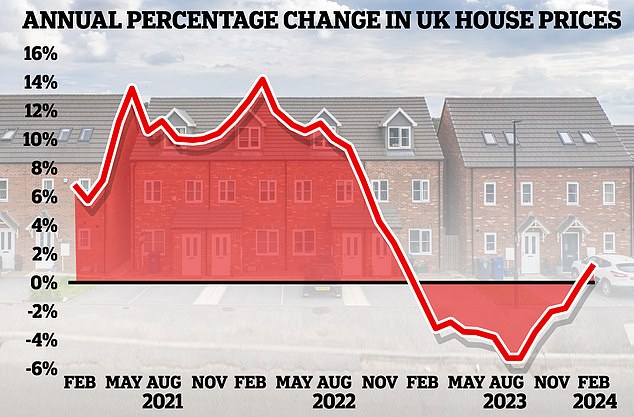Property prices rose in February due to lower mortgage rates, according to the latest Nationwide house price index.
Britain’s biggest building society recorded a 0.7 per cent increase in the average house price after taking account of seasonal effects.
It means house prices are up 1.2 per cent since this time last year, the first time Nationwide has recorded a positive annual reading since January 2023.
But prices are still around 3 per cent below the all-time highs recorded in the summer of 2022.

Yearly rise: Nationwide recorded a year-on-year house price rise for the first time in 13 months
Average house prices hit a high of £273,751 in August 2022, according to Nationwide. They are currently at £260,420 as of February.
The recent uptick in prices is being put down to lower mortgage rates. Although rates went up last month, this came after five consecutive months in which mortgage rates fell.
The average two-year fix has fallen from a high of 6.86 per cent to 5.75 per cent, according to Moneyfacts, while the average five-year fix has fallen from a high of 6.37 per cent to 5.33 per cent.
For home buyers with the biggest deposits, it is now possible to secure a five year fix at 4.09 per cent and a two-year fix at 4.39 per cent.
Robert Gardner, Nationwide’s chief economist said: ‘The decline in borrowing costs around the turn of the year appears to have prompted an uptick in the housing market.
‘Indeed, industry data sources point to a noticeable increase in mortgage applications at the start of the year, while surveyors also reported a rise in new buyer enquiries.’

More affordable? Mortgage rates have fallen from the highs recorded in summer 2023
Yesterday, Zoopla’s house price index reported an uptick in the number of buyers and sellers in the market which resulted in more sales during the start of 2024.
Many across the property sector have welcomed Nationwide’s figures as evidence that the property market is rallying.
Nicky Stevenson, managing director at national estate agent group Fine & Country said: ‘Positive signs for the property market are turning from a trickle to a flood this year, with annual house price change increasing for the first time in 13 months.
‘Demand is building as lower mortgage rates have encouraged buyers to restart their property search, and plunging inflation suggests better news is to come.
‘We’re heading into one of the prime seasons for home sales, and sellers should look at this as a great time to get their home on the market.’

Warming up? Zoopla reported that buyer demand is 11% higher than a year ago, while the number of agreed sales is up 15% year-on-year
Jonathan Hopper, chief executive of Garrington Property Finders, added: ‘It’s a bounce back, not a blip. Nationwide’s data shows house prices have risen in four out of the past five months, and the upward momentum is now so strong that prices are up on this time last year.
‘Crucially the market has also become more free-flowing. For sale signs are starting to sprout from homes across the country, and estate agents report a steady uptick in interest from both buyers and sellers.
‘Increasing numbers of buyers who sat on their hands last year are deciding that now is the time to strike, before prices start to accelerate upwards.’

Rising: But Nationwide says house prices remain around 3% below the all time highs recorded in the summer of 2022
Further rises ‘will depend on mortgage rates’
Nationwide’s chief economist had a word of caution over future interest rates.
‘Near-term prospects remain highly uncertain in part due to ongoing uncertainty about the future path of interest rates.
‘Borrowing costs remain well below the highs recorded last summer but, if the recent upward trend is sustained, it threatens to restrain the pace of any housing market recovery.’
While house price indexes show the general trend across the country, the picture varies depending on where you live in the UK.
Nationwide’s house price index relates to its own approved mortgage applications and therefore doesn’t include cash buyers or mortgage data from other lenders.
Another lender which also tracks house prices based on its own mortgage applications is Halifax. It said that average prices rose by 2.5 per cent in the 12 months to January.
The house price figures from the ONS are widely viewed as the most comprehensive and accurate index. This is because the report by the UK’s official statisticians uses Land Registry data and is based on average sold prices.
However, property transactions often take months to complete, meaning the ONS figures don’t necessarily reflect what is happening in the housing market right now.
Earlier this month, the ONS revealed the average UK house price slipped 1.4 per cent in the year to December 2023.
Another monthly index comes from Rightmove. This tracks newly listed asking prices each month, which can give a more immediate picture of what is happening in the market, but doesn’t measure what houses are ultimately selling for.
Rightmove reported average asking prices rose by 0.9 per cent in February to £362,839, according to the latest data from the firm, following a 1.3 per cent rise in January.
Some links in this article may be affiliate links. If you click on them we may earn a small commission. That helps us fund This Is Money, and keep it free to use. We do not write articles to promote products. We do not allow any commercial relationship to affect our editorial independence.




